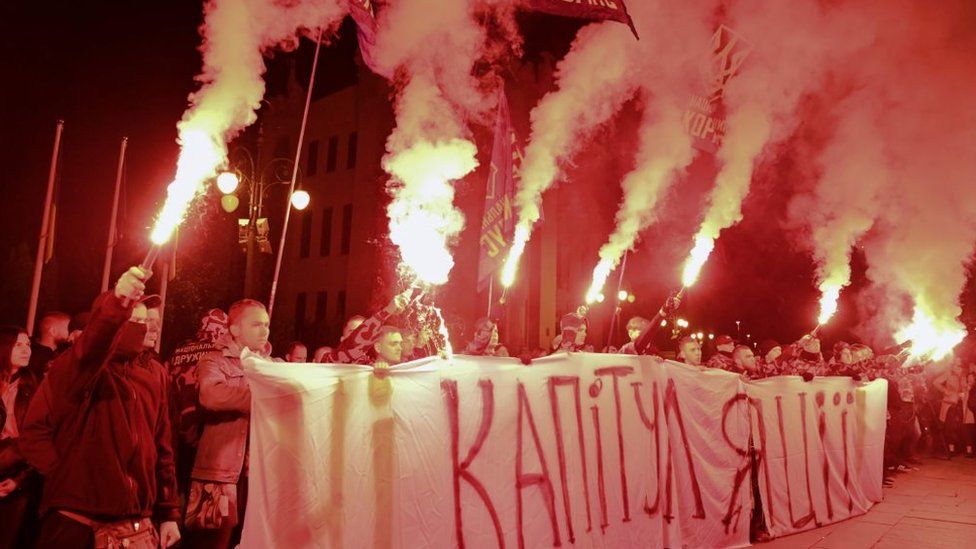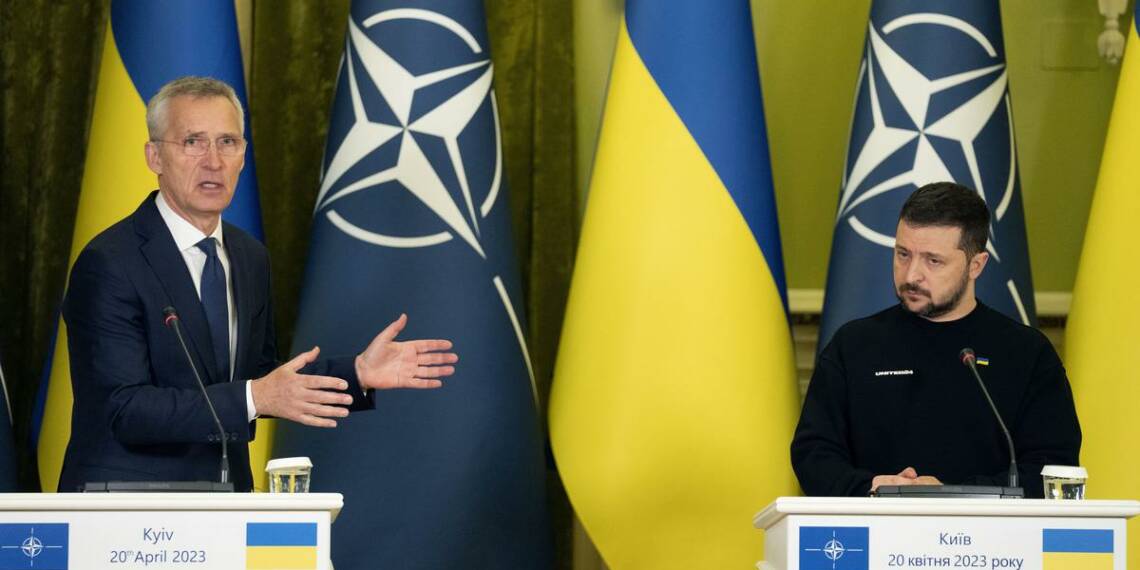In 2013, Ukrainians rallied against President Viktor Yanukovych’s refusal to sign an EU integration agreement, driven by aspirations for progress and democratic values. However, the Russia-Ukraine conflict reshaped priorities. The conflict’s upheaval shifted focus from EU integration to addressing internal instability and security concerns.
President Zelensky’s administration recognized the need for a stable foundation before pursuing EU ties. This pragmatic approach marked a departure from the earlier fervor for EU integration.
Ukrainian Doubts: NATO and EU Intentions
A prevailing sentiment of skepticism characterizes Ukrainian attitudes towards the NATO military alliance and the European Union (EU). This perception stems from the belief that these entities prioritize their own interests over Ukraine’s welfare. A recent survey conducted across Ukraine’s regions between July 25-27 reveals substantial mistrust in the motivations of NATO and the EU.
Specifically, 71% of respondents expressed the view that NATO and the EU employ Ukraine for their own objectives rather than genuinely advancing its interests. Additionally, 61% believe that their support is driven by the profitability of the Ukrainian situation for these blocs, further intensifying suspicions. Notably, the possibility of clandestine negotiations between NATO, the EU, and Russia is a concern shared by 61% of the respondents.

Furthermore, the survey underscores reservations about Ukraine’s immediate future. A mere 29% of those surveyed expect Ukraine to achieve NATO membership within the next year, indicating skepticism about the feasibility of this aspiration.
In the aftermath of the ongoing conflict, 56% of respondents anticipate Ukraine accruing indebtedness to Western nations for the supplied weaponry and assistance during the war.
Overall, the survey reveals a prevailing sense of wariness among Ukrainians, as they perceive the intentions of NATO and the EU as opportunistic and driven by self-interest. This underscores a complex relationship between the aspirations of Ukrainians for closer Western ties and their apprehensions about potential hidden agendas within international alliances.
Calculated Choices: Zelensky’s Dilemma
The transition of power from Yanukovych to Zelensky marked a significant juncture in Kyiv’s leadership landscape. Initially, Zelensky enjoyed considerable popularity, but this trajectory evolved as Russia’s incursion into Ukraine unfolded.
Initially, Ukrainian sentiment found contentment in the aid furnished by NATO and the EU. With Russia’s gradual advances into Ukrainian territories, the two blocs sustained support, pledging solidarity in the conflict.

However, the assurance of NATO and the EU that Ukraine’s struggle mirrored the West’s commitment waned in credibility. Russia’s actions disrupted Ukraine’s grain initiative and inflicted damage on the infrastructure of Black Sea ports, catalyzing a global food crisis and profoundly impacting Ukraine’s economy.
The Western promise of arming Kyiv revealed itself as hollow, resulting in the delivery of substandard weaponry. Russia’s incremental seizure of Donetsk, Luhansk, Zaporyzhia, and Kherson proceeded, met with limited action from Zelensky’s administration.
As the conflict evolved, it exposed the gap between the West’s assurances and the tangible assistance extended.
Read More: Zelensky was All Set to be Removed in a Coup but Things Changed Pretty Drastically
Transatlantic Tension: American Perspectives
Recent surveys underscore both American and Ukrainian sentiments regarding aid and the ongoing conflict. While Ukrainian skepticism towards NATO and the EU prevails, a recent CNN poll by SSRS illuminates that a majority of Americans, amounting to 56%, are opposed to providing further aid to Ukraine in its war against Russia.
Of these respondents, 51% believe their country has already extended sufficient assistance to aid Ukraine’s struggle against Russian forces.
Ukrainian weariness towards the conflict is evident in various aspects. The loss of strategic cities to Russia and the subsequent economic fallout has led to a sharp contraction in Ukraine’s economic growth for 2022. The Russian invasion prompted a considerable devaluation of the hryvnia by 25%, as decreed by the National Bank of Ukraine in July 2022.
Despite the challenges and losses, Zelensky’s administration persists in the conflict, albeit facing dwindling gains. The Ukrainian population is increasingly perceiving the costs of the war, juxtaposed against perceived Western profit. Consequently, a shift in sentiment is palpable as Ukrainians perceive their nation as losing significantly in the conflict while perceiving Western actors as benefiting from the situation.
In the midst of evolving sentiments, Zelensky’s pursuit of aid and support from NATO and the EU seems to be undergoing a transformation. The Ukrainian public’s weariness and perception of the West’s interests have contributed to a shift in sentiment.
Read More: Zelensky creates an iron curtain around Ukraine
Zelensky’s decision to persist in the war, despite diminishing returns, reflects a complex interplay of factors. As Ukraine’s relationship with the NATO and EU alliances undergoes a recalibration, the nation’s trajectory seems to be moving away from the romance of NATO and towards a more pragmatic assessment of its interests in the face of an ongoing conflict with Russia.
Watch More:








